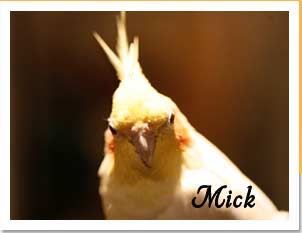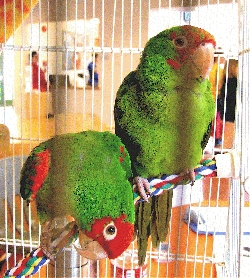Ringneck Doves as Pets
By Cathy Kendall, a MickaCoo volunteer
Doves make excellent pets. I’ve kept -- and loved-- many species of birds including geese, chickens, pigeons, parrots and finches, but I have a special place in my heart for doves, especially Ringnecks. They are beautiful, gregarious, friendly birds and are easily cared for. They don’t bite or scream and they will amuse you with their antics. Their generally peaceful, easy-going ways make them a good choice for both experienced and first-time bird adopters. |
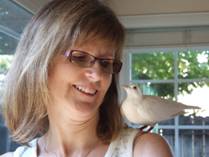 |
Ringneck Doves can be kept indoors or out. Single doves can become quite affectionate and attached to their owners; however, they are social and are happiest with dove companions. Same-sex companions can live happily together or they can be kept in pairs or small flocks. Should you adopt a true pair you will need to replace the hen’s eggs with artificial ones, a practice we call “birdy birth control.” Because they breed so readily in captivity, there are many domestic doves in need of homes so it’s not advisable to ra ise more doves. All too often MickaCoo Pigeon & Dove Rescue is contacted by someone who has suffered a change of circumstance and must suddenly attempt to find homes for a whole aviary full of doves. It is not a happy situation for the doves or their owners.
ise more doves. All too often MickaCoo Pigeon & Dove Rescue is contacted by someone who has suffered a change of circumstance and must suddenly attempt to find homes for a whole aviary full of doves. It is not a happy situation for the doves or their owners.
A single pet Ringneck Dove may be housed in a cage at least 24” x 30” though larger is always better. A dove kept in a cage that size should be allowed daily supervised time out of the cage for exercise and interaction with her people. A flight cage 62” high, 32” wide and 21” deep makes a suitable indoor home for a pair of Ringneck Doves.
If you plan to keep your doves outdoors (they love sunshine and fresh air), you will need to build a sturdy aviary. The aviary must provide shelter from cold, wet weather as well as protect the doves from hawks, raccoons and neighborhood cats. This is accomplished by using welded wire with openings no larger than ½” square. The enclosure must also keep out rats and mice. An attractive aviary can be a lovely addition to your yard. When properly constructed it should require just a few minutes each day to keep your doves happy and healthy and you will enjoy many pleasant hours watching them. They are hardy birds and do not require supplemental heat during our mild Bay Area winters.
A word of caution if you plan to adopt multiple doves: though generally peaceful, male Ringnecks can be quite territorial and it’s recommended that you allow four square feet of floor space per pair.
 |
 |
Doves have the same basic feed and care requirements as pigeons: a grain mix containing between 12-16% protein, pigeon grit and clean water. I feed my doves a high quality cockatiel mix with extra safflower seed added as a treat. I frequently provide my Ringnecks with millet sprays, which they enjoy very much. They love greens and minced veggies and happily devour well-washed romaine lettuce leaves several times a week.
Ringneck Doves have been bred in many color variations including pure white, tangerine, pied and orange in addition to the deep gray-and-lavender wild type. They don’t come in bright colors like parrots, but their soft colors are lovely nonetheless. When properly cared for they can live for 20 years, so you can enjoy their companionship for a long time. If you are looking for a gentle, beautiful, undemanding pet, a dove just might be the right bird for you. |
 |
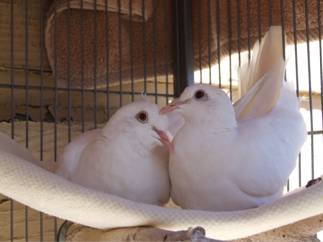 |
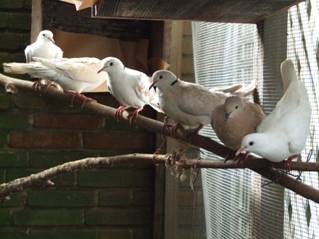 |
MickaCoo has many doves in need of adopters! Please visit these links for more information:
Available Birds
How to Create an Aviary
Adoption Application
www.MickaCoo.org
Contact: Elizabeth at AdoptKings@gmail.com
